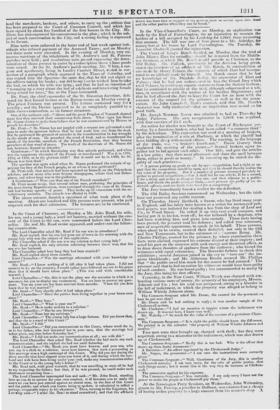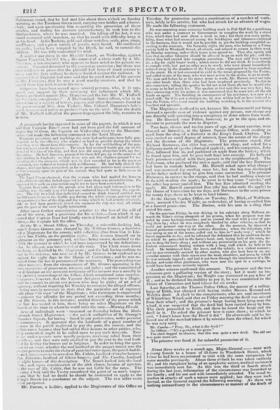In the Vice-Chancellor's Court, on Monday, an application was made
by the Earl of Portarlington, for an injunction to restrain the holders of a bill accepted by his Lordship for 1,000/. from recovering that amount. The bill was one of four given to a Mr. Aldridge, for money lost at his house by Lord Portarlington. On Tuesday, Sir Lancelot Shadwell granted the injunction.
The Court of King's Bench decided, on 11Ionday, that the trial of John Minter Hart for swindlims should be removed from the Middle- sex Sessions, et which Mr. Rota h would preside as Chairman, to the Old Bailey. Mr. Pollock, previously to the decision being given, stated the content, of an affidavit of Mr. Rotch, in contradiction of one made by Henry Palmer, the contents of which Hart had incorpo-
rated in an affidavit made by himself. Mr. notch swore that he had no knowledge of Mr. Dugdale Asrloy. the prosecutor of Hart and Palmer ; that he had not endeavoured to bias the Grand Jury which tried Palmer, by rending an exparte statement from the Satirist to them; that lie continued to preside at the trial, although subpoenaed as a wit- ness, in accordance with the wishes of his brother Magistrates ; and that lie had allowed the Jury to leave the Court for an hour with the consent of the counsel for the prisoner, as well as for the prose- cution. Sir John Campbell, Hart's comisel, said that Mr. Rotch's character was fully vindicated—that no imputation now rested on his good fitith.
Mr. Joseph Newman Reeve was admitted to bail on Thursday by Judge Patteson. His own recognizance in 1,0001. was required, with four sureties of 2311. each.
An action for slander was brought in the Court of Exchequer yes- terday, by a furniture-broker, who had been called " a common thief " by the defendant. This expression was used at a meeting of brokers, after the termination of a sale at Hackney, at which the plantiff had been bidding along with several others. The meeting, in the language of the trade, was "a broker's knock-out." Baron Gurney thus explained the meaning of the phrase—" Several brokers agree to- gether not to bid against each other. One bids, and gets the articles at a low price; they then meet afterwards and share the spoil between them, either in goods or money." In summing up, he stated the ille- gality of such practices-
" A person putting up goods to sale by open competition, had a right to ex- pect that the competition should be open, and that he should thereby realize the fair value of his property. But if a number of persons arranged privately to- gether to prevent competition,—tbat A shall bid for one article, B for a second, C for a third, and so buy as cheap as they can, and then adjourn to a public- house, and divide the profit amongst them,—sue/ persons are guilty of an in- dictable offence, and are liable to be hied for a conspiracy."
The Jury immediately found a verdict for the defendant.
The Old Bailey Sessions commenced on Wednesday ; but the trials have not possessed any public interest.
On Thursday, Henry Berthold, a Saxon, who has lived many years in England, and has lately been known as a writer for unstamped poli- tical papers, was indicted for stealing a boa from the shop of Leaf and Co., in Wood Street, He rolled it up into very small compass, and having put it in his hat, went off; he was followed by a shopman, who had been watching him, and given into custody. These facts having been proved, the prisoner read his defence ; and called two witnesses, men of respectable appearance, to speak. in his behalf. These persons, when about to be sworn, avowed their disbelief, not only in the Old and New Testaments, but in the existence of a Supreme Being. Mr. Charles Phillips, counsel for the prisoner, by whose examination these facts were elicited, expressed his extreme disgust at their impiety ; and acted his part on the occasion with such energy and theatrical effect, as to draw down thunders of applause from the audience ; who hissed the witnesses with equal vehemence. The Recorder forbore to check this exhibition ; several Jurymen joined in the cry to " turn out" the im- pious blockheads; and Mr. Alderman Brown assured Mr. Phillips that " the public owed him much for the course he had pursued." The prisoner said that he had no notion his witnesses would have been guilty of such conduct. He was found guilty; but recommended to mercy by the Jury, this being his first offence.
Yesterday, in the New Court, William Welch was charged with em- bezzling various sums of money, the property of his employers, Messrs. Johnson and Co. ; but his trial was postponed, owing to a blunder in the bill of indictment, in which the property was alleged to belong to Willirun Whittle Johnson alone.
The Common-Sergeant asked Mr. Doane, the counsel for the prosecuti on how he got over that ?
Mr. Doane said he had nothing to reply ; it was another sample of the Clerkenwell system. Mr. Clarkson—" I had no occasion to inquire where the indictment was drawn up. It was not here, I know very well." Mr. Walesby—" So much for the value of the services of a gratuitous Chair- man."
The Common-Sergeant—" It is right the public should know the difference. We printed it in the calendar 'the property of William Whittle Johnson and another.' "
Two men were then brought up, charged with theft ; but they were acquitted, owing to a misnomer in the indictment, which was also drawn up at Clerkenwell.
The Common-Sergeant—" Really this is too bad. Who is the officer that draws up these faulty documents?"
A Barrister—" An officer appointed by the Clerkenwell Judge."
Mr. Nugee, the prosecutor—" I am sure the instructions were correctly given." The Common-Sergeant—" Well, Gentlemen of the Jury, this is another Clerkenwell mistake. I am very sorry, for the sake of public justice, that such things occur; but it seems this is the way they do business at Clerken- The prosecutor applied for his expenses. The Common-Sergeant—" Yes, certainly. I am only sorry I have not the power to make the people at Clerkenwell pay them."
At the Kensington Petty Sessions, on Wednesday, John Wahmesley, groom to Mr. Perring, a jewellerin Holborn, was examined on a charge of having stolen property to a large amount from his master's shop A
'Policeman stated, that he had met him about three o'clock on Sunday noming, on the Turuham Green road, carrying two bridles and a horse- (-loth; and upon questioning him respecting the posses'sion of these snicks, and finding his answers unsatisfactory, he took him to the 'station-house, where he was searched. On taking off his hat, it was 1etarel crammed with bracelets, so that he could with difficulty keep it
• ert his head. In his sockets, gold and silver watches, seals, pins, rings, emuffboxes, nnd a great variety of jewels, were found. He confessed
its ; haying been tempted by the Devil, he said, to commit the etelrery. lle was fully committed for trial.
A verdict was given in the Sheriffs' Court, on Wednesday, against Paganini, for 21/. 10s. ; the amount of a claim made by a Mr.
• *rt•;rutn, a law-stationer, who appears to have acted as his private se- retire. Paganini demurred to the amount as excessive ; but there was evidence to prove that the plaintiff had been of much service to Me ; and the Jury without hesitation decided against the violinist. It apaeared that Paganini had once said that he owed much of his success
?1r. Freeman; that he was a good worthy creature, and that he amated from him with tears in his eyes.
Sapoems have been served upon several persons, who, it is sup- 4ost-0, eau support by their testimony the indictment which Mr. %roes preferred against Mrs. Ilempton pal the late Mr. W. Tuffnell 'or ‘. certitio conspiracies." A 111er:borough Street officer, who is in ooseession of a variety of letters, papers, and other documents found in be possession of Mrs. Ann Vickers, Mrs. Colonel Hampton's lady's
• /miff, Ir.r, reec:ved anti cc to produce them on time trial. How the death laf Mr. Tu1hnell will affect the proceedings against the lady, remains to at; seen.















 Previous page
Previous page